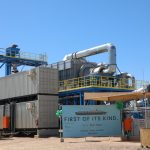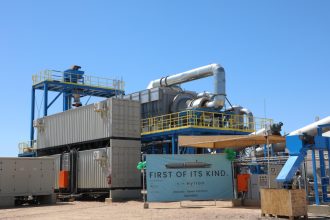By Irish Goroh
Namibia is at a critical juncture. With a population of 3.02 million, and 71.1% under the age of 35, the country faces a demographic dividend that remains largely untapped.
Youth unemployment stands at 44.4%, and despite a growing number of graduates, industry reports a persistent skills mismatch. Meanwhile, emerging sectors—including energy (oil & gas, renewable energy, biomass), agriculture, and climate-smart resource management—are expanding rapidly, demanding a workforce equipped to innovate and lead. Yet, energy generation continues to fall short of peak demand (>600 MW), constraining industrial growth and sustainability.
A Solution-Oriented Education Ecosystem
The Namibia Centre of Excellence for Energy Innovation, a partnership between the United Nations Development Programme (UNDP) and the Namibia University of Science and Technology (NUST), through the Namibia Energy Institute (NEI), proposes a bold shift: moving beyond traditional, time-bound education models to a responsive, problem-solving ecosystem. This approach focuses on equipping learners with the skills, tools, and networks needed to deliver real-world solutions in high-impact sectors. Aligned with Priority 2 of Namibia’s NDP6, the UN Sustainable Development Cooperation Framework (UNSDCF), and NUST’s Green Vision 2030, the Centre aims to contribute to:
- Economic recovery and transformation: Driving economic recovery and transformation by keeping pace with rapidly evolving energy industry demands, through strengthened skills and workforce competencies that enhance local competitiveness in the sector
- Decent jobs and sustainable livelihoods, ensuring students are not only graduates but are empowered through access to infrastructure, technology, and a supportive co-design environment to create employment opportunities for themselves and others.
- Reduced inequalities for youth and marginalized communities by delivering inclusive energy solutions that address local challenges and unlock emerging opportunities, ensuring that the Just Energy Transition is shaped by all and benefits all — with equitable participation supported through access to infrastructure, technology, and equipment that enable them to test and scale their ideas within energy value chains.
Proposed Interventions
The Centre of Excellence for Energy Innovation, a national hub for applied research, technical training, and entrepreneurship in green energy, with integration into mining, water, and decarbonisation initiatives, will offer hands-on learning, mentorship, and infrastructure for prototyping and testing—for both students and industry.
Curriculum Innovation: Modular, interdisciplinary programs co-developed with industry to address sector-specific challenges.
Private Sector Engagement: Strong partnerships to create pathways for employment and industry development, ensuring relevance and long-term impact. Endowments and blended financing will support continuity, scale, and sustainability.
The vision is to strengthen connections between academia, industry, the public sector, and communities—transforming Namibia’s education system into a dynamic, solution-oriented ecosystem. By attracting investment towards promising local solutions—while rigorously testing and verifying their scalability and impact—this transformation aims to unlock a pipeline of market-ready innovations, expand value chains, and position the country as a regional leader in inclusive green growth and energy innovation.
- Irish Goroh currently serves as Portfolio Lead for the Sustainable Inclusive Green Growth portfolio at UNDP Namibia. She oversees a multidisciplinary team delivering transformative projects in food systems, health, climate resilience, and green growth.






